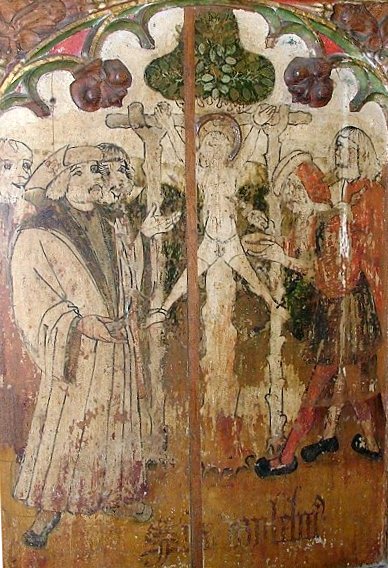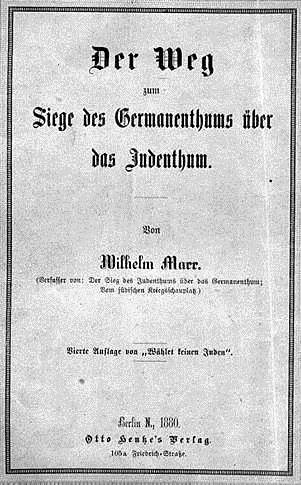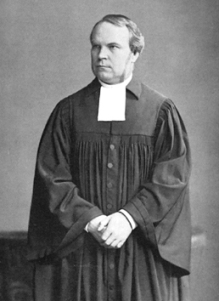|
Berlin Movement
The Berlin movement was an anti-Semitic intellectual and political movement in the German Empire in the 1880s. The movement was a collection of unassociated individuals and organizations. The movement developed in the aftermath of the Panic of 1873 that led to a recession in the United States and parts of the western European economy. It assailed Jews and capitalism; along with this critique it opposed liberalism and it represented a fear of social democracy. Finally, the movement came out of a racial conception of national identity on the part of the German middle class. The movement had several leaders. The journalist and author Otto Glagau led a journal, ''Der Kulturkämpfer,'' he Culture Warriorthat propagated these ideas. The Lutheran theologian and politician, Adolf Stoecker, led the Christian Social Party. He was the only elected representative of the party in the Reichstag. The movement lost strength after the CSP's losses in the 1887 elections. Additionally, ... [...More Info...] [...Related Items...] OR: [Wikipedia] [Google] [Baidu] |
Anti-Semitic
Antisemitism (also spelled anti-semitism or anti-Semitism) is hostility to, prejudice towards, or discrimination against Jews. A person who holds such positions is called an antisemite. Antisemitism is considered to be a form of racism. Antisemitism has historically been manifested in many ways, ranging from expressions of hatred of or discrimination against individual Jews to organized pogroms by mobs, police forces, or genocide. Although the term did not come into common usage until the 19th century, it is also applied to previous and later anti-Jewish incidents. Notable instances of persecution include the Rhineland massacres preceding the First Crusade in 1096, the Edict of Expulsion from England in 1290, the 1348–1351 persecution of Jews during the Black Death, the massacres of Spanish Jews in 1391, the persecutions of the Spanish Inquisition, the expulsion from Spain in 1492, the Cossack massacres in Ukraine from 1648 to 1657, various anti-Jewish pogroms in the Russ ... [...More Info...] [...Related Items...] OR: [Wikipedia] [Google] [Baidu] |
1887 German Federal Election
Federal elections were held in Germany on 21 February 1887.Dieter Nohlen & Philip Stöver (2010) ''Elections in Europe: A data handbook'', p762 The National Liberal Party became the largest party in the Reichstag by winning 98 of the 397 seats, whilst the Centre Party, formerly the largest party, was reduced to 98 seats. Voter turnout was 77.5%.Nohlen & Stöver, p774 Results Alsace-Lorraine References {{German elections Federal elections in Germany Germany Germany, officially the Federal Republic of Germany (FRG),, is a country in Central Europe. It is the most populous member state of the European Union. Germany lies between the Baltic and North Sea to the north and the Alps to the sou ... 1887 elections in Germany Elections in the German Empire February 1887 events ... [...More Info...] [...Related Items...] OR: [Wikipedia] [Google] [Baidu] |
Politics Of The German Empire
Politics (from , ) is the set of activities that are associated with making decisions in groups, or other forms of power relations among individuals, such as the distribution of resources or status. The branch of social science that studies politics and government is referred to as political science. It may be used positively in the context of a "political solution" which is compromising and nonviolent, or descriptively as "the art or science of government", but also often carries a negative connotation.. The concept has been defined in various ways, and different approaches have fundamentally differing views on whether it should be used extensively or limitedly, empirically or normatively, and on whether conflict or co-operation is more essential to it. A variety of methods are deployed in politics, which include promoting one's own political views among people, negotiation with other political subjects, making laws, and exercising internal and external force, including w ... [...More Info...] [...Related Items...] OR: [Wikipedia] [Google] [Baidu] |
19th Century In Berlin
19 (nineteen) is the natural number following 18 and preceding 20. It is a prime number. Mathematics 19 is the eighth prime number, and forms a sexy prime with 13, a twin prime with 17, and a cousin prime with 23. It is the third full reptend prime, the fifth central trinomial coefficient, and the seventh Mersenne prime exponent. It is also the second Keith number, and more specifically the first Keith prime. * 19 is the maximum number of fourth powers needed to sum up to any natural number, and in the context of Waring's problem, 19 is the fourth value of g(k). * The sum of the squares of the first 19 primes is divisible by 19. *19 is the sixth Heegner number. 67 and 163, respectively the 19th and 38th prime numbers, are the two largest Heegner numbers, of nine total. * 19 is the third centered triangular number as well as the third centered hexagonal number. : The 19th triangular number is 190, equivalently the sum of the first 19 non-zero integers, that is also ... [...More Info...] [...Related Items...] OR: [Wikipedia] [Google] [Baidu] |
Antisemitism In Germany
Antisemitism (also spelled anti-Semitism)—prejudice, hatred of, or discrimination against Jews— has experienced a long history of expression since the days of ancient civilizations, with most of it having originated in the Christianity, Christian and pre-Christian civilizations of Europe. While it has been cited as having been expressed in the intellectual and political centers of ancient Greece and the Roman Empire, the phenomenon received greater institutionalization within European Christianity following the dissolution of the ancient center of Jewish culture, Jerusalem, resulting in the Jewish ghettos in Europe, forced segregation of Jewish populations and restrictions on their participation in the public life of European society at times. In the 20th century, antisemitism , particularly during the reign of Nazi Germany, resulted in the Holocaust, a program of systematic murder and dislocation of the majority of Europe's Jewish population. Roman Empire Middle Ages A ... [...More Info...] [...Related Items...] OR: [Wikipedia] [Google] [Baidu] |
Antisemitism
Antisemitism (also spelled anti-semitism or anti-Semitism) is hostility to, prejudice towards, or discrimination against Jews. A person who holds such positions is called an antisemite. Antisemitism is considered to be a form of racism. Antisemitism has historically been manifested in many ways, ranging from expressions of hatred of or discrimination against individual Jews to organized pogroms by mobs, police forces, or genocide. Although the term did not come into common usage until the 19th century, it is also applied to previous and later anti-Jewish incidents. Notable instances of persecution include the Rhineland massacres preceding the First Crusade in 1096, the Edict of Expulsion from England in 1290, the 1348–1351 persecution of Jews during the Black Death, the massacres of Spanish Jews in 1391, the persecutions of the Spanish Inquisition, the expulsion from Spain in 1492, the Cossack massacres in Ukraine from 1648 to 1657, various anti-Jewish pogroms in th ... [...More Info...] [...Related Items...] OR: [Wikipedia] [Google] [Baidu] |
Anti-liberalism
Liberalism is a political and moral philosophy based on the rights of the individual, liberty, consent of the governed, political equality and equality before the law."political rationalism, hostility to autocracy, cultural distaste for conservatism and for tradition in general, tolerance, and ... individualism". John Dunn. ''Western Political Theory in the Face of the Future'' (1993). Cambridge University Press. . Liberals espouse various views depending on their understanding of these principles. However, they generally support private property, market economies, individual rights (including civil rights and human rights), liberal democracy, secularism, rule of law, economic and political freedom, freedom of speech, freedom of the press, freedom of assembly, and freedom of religion. Liberalism is frequently cited as the dominant ideology of modern times.Wolfe, p. 23.Adams, p. 11. Liberalism became a distinct movement in the Age of Enlightenment, gaining popular ... [...More Info...] [...Related Items...] OR: [Wikipedia] [Google] [Baidu] |
Otto Von Bismarck
Otto, Prince of Bismarck, Count of Bismarck-Schönhausen, Duke of Lauenburg (, ; 1 April 1815 – 30 July 1898), born Otto Eduard Leopold von Bismarck, was a conservative German statesman and diplomat. From his origins in the upper class of Junker landowners, Bismarck rose rapidly in Prussian politics, and from 1862 to 1890 he was the minister president and foreign minister of Prussia. Before his rise to the executive, he was the Prussian ambassador to Russia and France and served in both houses of the Prussian Parliament. He masterminded the unification of Germany in 1871 and served as the first Chancellor of the German Empire until 1890, in which capacity he dominated European affairs. He had served as the chancellor of the North German Confederation from 1867 to 1871, alongside his responsibilities in the Kingdom of Prussia. He cooperated with King Wilhelm I of Prussia to unify the various German states, a partnership that would last for the rest of Wilhelm's life. The ... [...More Info...] [...Related Items...] OR: [Wikipedia] [Google] [Baidu] |
Reichstag (German Empire)
The Reichstag () of the German Empire was Germany's lower house of parliament from 1871 to 1918. Within the governmental structure of the Reich, it represented the national and democratic element alongside the federalism of the Bundesrat and the monarchic and bureaucratic element of the executive, embodied in the Reich chancellor. Together with the Bundesrat, the Reichstag had legislative power and shared in decision-making on the Reich budget. It also had certain rights of control over the executive branch and could engage the public through its debates. The emperor had little political power, and over time the position of the Reichstag strengthened with respect to the Bundesrat. Reichstag members were elected for three year terms from 1871 to 1888 and following that for five years. It had one of the most progressive electoral laws of its time: with only a few restrictions, all men 25 and older were allowed to vote, secretly and equally. The Reichstag met throughout the First ... [...More Info...] [...Related Items...] OR: [Wikipedia] [Google] [Baidu] |
German Empire
The German Empire (), Herbert Tuttle wrote in September 1881 that the term "Reich" does not literally connote an empire as has been commonly assumed by English-speaking people. The term literally denotes an empire – particularly a hereditary empire led by an emperor, although has been used in German to denote the Roman Empire because it had a weak hereditary tradition. In the case of the German Empire, the official name was , which is properly translated as "German Empire" because the official position of head of state in the constitution of the German Empire was officially a " presidency" of a confederation of German states led by the King of Prussia who would assume "the title of German Emperor" as referring to the German people, but was not emperor of Germany as in an emperor of a state. –The German Empire" ''Harper's New Monthly Magazine''. vol. 63, issue 376, pp. 591–603; here p. 593. also referred to as Imperial Germany, the Second Reich, as well as simply Germa ... [...More Info...] [...Related Items...] OR: [Wikipedia] [Google] [Baidu] |
Christian Social Party (Germany)
The Christian Social Party (german: Christlich–soziale Partei, CSP) was a right-wing political party in the German Empire founded in 1878 by Adolf Stoecker as the Christian Social Workers' Party (german: Christlichsoziale Arbeiterpartei, CSPA). The party combined a strong Christian-right programme with progressive ideas on labour and tried to provide an alternative for disillusioned Social Democrat voters. Part of the Berlin movement, it increasingly focused on the Jewish question with a distinct antisemitic attitude. History In December 1877, Adolf Stoecker, domestic chaplain at the court of Emperor Wilhelm I and board member of the Evangelical Church of the Prussian Union, together with the economist Adolph Wagner had founded the Central Association for Social Reform (''Zentralverein für Sozialreform''), dealing with injustice and poverty after the Industrial Revolution. The organization was meant to counter the rise of the presumably revolutionary Social Democratic Pa ... [...More Info...] [...Related Items...] OR: [Wikipedia] [Google] [Baidu] |
Adolf Stoecker
Adolf Stoecker (December 11, 1835 – February 2, 1909) was a German court chaplain to Kaiser Wilhelm I, a politician, leading antisemite, and a Lutheran theologian who founded the Christian Social Party to lure members away from the Social Democratic Workers' Party. Early life Stoecker was born in Halberstadt, Province of Saxony, in the Kingdom of Prussia. Stoecker's father was a blacksmith turned prison guard, and despite his poverty, Stoecker was able to attend university, which was unusual for a working-class man in the 19th century.Telman, Jeffrey "Adolf Stoecker: Anti-Semite with a Christian Mission" pages 93-112 from ''Jewish History'', Volume 9, Issue # 2. Fall 1995 page 99. An energetic and hardworking Protestant pastor who wrote widely on various social and political issues, Stoecker had a charismatic personality which made him one of Germany's best loved and most respected Lutheran clergyman.Green Harold "Adolf Stoecker: Portrait of a Demagogue" pages 106 ... [...More Info...] [...Related Items...] OR: [Wikipedia] [Google] [Baidu] |








